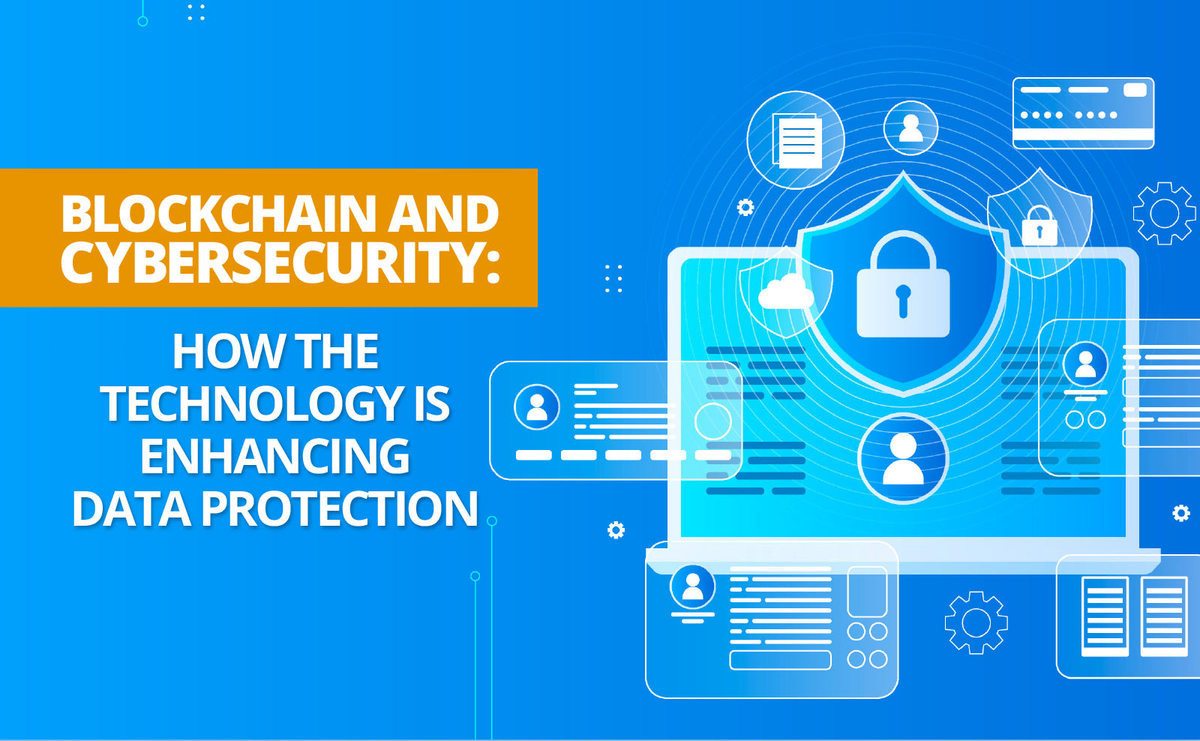How Blockchain Technology is Enhancing Cybersecurity

- Understanding the basics of blockchain technology
- The role of blockchain in securing digital transactions
- Exploring the decentralized nature of blockchain for cybersecurity
- Benefits of using blockchain for data protection
- Challenges and limitations of integrating blockchain in cybersecurity
- Future implications of blockchain technology on cybersecurity
Understanding the basics of blockchain technology
Blockchain technology is a decentralized, distributed ledger system that securely records transactions across a network of computers. Each block in the chain contains a cryptographic hash of the previous block, creating a secure and tamper-proof record of all transactions. This technology is revolutionizing cybersecurity by providing a transparent and immutable record of data exchanges, making it extremely difficult for hackers to alter or corrupt information.
One of the key features of blockchain technology is its ability to provide a high level of security through encryption and consensus mechanisms. By using advanced cryptographic techniques, blockchain ensures that data is securely stored and transmitted, reducing the risk of unauthorized access or data breaches. Additionally, the decentralized nature of blockchain means that there is no single point of failure, making it more resilient to cyber attacks.
Another important aspect of blockchain technology is its transparency and traceability. Each transaction recorded on the blockchain is visible to all participants in the network, creating a transparent and auditable record of data exchanges. This transparency helps to build trust among users and ensures the integrity of the data stored on the blockchain.
In conclusion, blockchain technology is enhancing cybersecurity by providing a secure, transparent, and tamper-proof record of data exchanges. Its decentralized nature, encryption techniques, and transparency features make it an ideal solution for protecting sensitive information from cyber threats. As the technology continues to evolve, it is expected to play an increasingly important role in safeguarding data and enhancing cybersecurity measures across various industries.
The role of blockchain in securing digital transactions
Blockchain technology plays a crucial role in enhancing cybersecurity by providing a secure and transparent way to conduct digital transactions. By utilizing a decentralized and distributed ledger system, blockchain ensures that transactions are recorded in a tamper-proof manner, making it extremely difficult for malicious actors to alter or manipulate the data.
One of the key features of blockchain is its ability to create a chain of blocks that are linked together using cryptographic hashes. Each block contains a list of transactions, and once a block is added to the chain, it is virtually impossible to alter the information stored within it without altering all subsequent blocks. This makes blockchain an ideal solution for securing digital transactions, as any attempt to tamper with the data would be immediately detected by the network.
Furthermore, blockchain technology employs consensus mechanisms such as proof of work or proof of stake to validate transactions and ensure that only legitimate transactions are added to the ledger. This helps prevent fraudulent activities and ensures the integrity of the data stored on the blockchain.
In addition to securing transactions, blockchain technology also enhances cybersecurity by providing a high level of transparency and traceability. Each transaction recorded on the blockchain is visible to all participants in the network, allowing for real-time monitoring and auditing of transactions. This transparency helps to build trust among users and reduces the risk of fraud or unauthorized activities.
Overall, the role of blockchain in securing digital transactions cannot be overstated. Its decentralized nature, cryptographic security, and transparency make it a powerful tool for enhancing cybersecurity and protecting sensitive data from cyber threats. As the digital landscape continues to evolve, blockchain technology will play an increasingly important role in safeguarding digital transactions and ensuring the integrity of online transactions.
Exploring the decentralized nature of blockchain for cybersecurity
One of the key aspects of blockchain technology that is revolutionizing cybersecurity is its decentralized nature. Unlike traditional centralized systems where data is stored in a single location, blockchain distributes data across a network of computers, making it more secure and less vulnerable to cyber attacks.
By utilizing a decentralized network, blockchain technology eliminates the single point of failure that is often targeted by hackers in centralized systems. Each block in the blockchain contains a cryptographic hash of the previous block, creating a chain of blocks that are linked together and secured using advanced encryption techniques.
Furthermore, the decentralized nature of blockchain ensures that no single entity has control over the entire network, making it resistant to tampering and manipulation. This distributed consensus mechanism makes it extremely difficult for malicious actors to alter the data stored on the blockchain without being detected.
Overall, the decentralized nature of blockchain technology provides a robust and secure framework for enhancing cybersecurity measures. By leveraging the power of distributed networks and cryptographic algorithms, organizations can significantly improve their defenses against cyber threats and safeguard their sensitive data from unauthorized access.
Benefits of using blockchain for data protection
Utilizing blockchain technology for data protection offers numerous benefits that enhance cybersecurity measures. By leveraging the decentralized and immutable nature of blockchain, organizations can significantly improve the security of their sensitive information. Some of the key advantages of using blockchain for data protection include:
- Enhanced Security: Blockchain’s cryptographic algorithms and decentralized structure make it extremely difficult for hackers to compromise data stored on the network.
- Data Integrity: The immutability of blockchain ensures that once data is recorded, it cannot be altered or tampered with, providing a high level of data integrity.
- Transparency: Blockchain’s transparent nature allows for all transactions to be recorded and verified, increasing accountability and reducing the risk of fraudulent activities.
- Decentralization: By distributing data across a network of nodes, blockchain eliminates single points of failure, making it more resilient to cyber attacks.
- Improved Data Management: Blockchain technology enables secure and efficient data sharing among authorized parties, streamlining processes and reducing the risk of data breaches.
Overall, the use of blockchain for data protection not only enhances cybersecurity but also provides a more robust and reliable framework for safeguarding sensitive information. As organizations continue to face evolving cyber threats, integrating blockchain technology into their security strategies can offer a proactive and effective defense mechanism against malicious actors.
Challenges and limitations of integrating blockchain in cybersecurity
Integrating blockchain technology in cybersecurity comes with its own set of challenges and limitations that need to be addressed for successful implementation.
- Scalability: One of the main challenges of integrating blockchain in cybersecurity is the issue of scalability. As the number of transactions increases, the blockchain network may become slower and less efficient, making it difficult to handle a large volume of data.
- Cost: Implementing blockchain technology can be costly, especially for small to medium-sized businesses. The initial investment required for setting up a blockchain network and maintaining it can be a barrier for many organizations.
- Regulatory concerns: The regulatory environment surrounding blockchain technology is still evolving, which can pose challenges for organizations looking to integrate it into their cybersecurity measures. Compliance with data protection laws and regulations can be a complex process.
- Interoperability: Ensuring that different blockchain networks can communicate with each other seamlessly is another limitation of integrating blockchain in cybersecurity. Lack of standardization and compatibility between different blockchain platforms can hinder the effectiveness of cybersecurity measures.
- Security risks: While blockchain technology is known for its security features, it is not immune to vulnerabilities. Smart contract bugs, 51% attacks, and other security risks can still pose a threat to the integrity of the blockchain network.
Despite these challenges and limitations, the potential benefits of integrating blockchain technology in cybersecurity are significant. By addressing these issues and finding solutions, organizations can enhance their cybersecurity measures and protect their data more effectively.
Future implications of blockchain technology on cybersecurity
Blockchain technology has the potential to revolutionize cybersecurity in the future. By providing a decentralized and secure way to store data, blockchain can significantly enhance the protection of sensitive information from cyber threats. One of the key implications of blockchain on cybersecurity is the elimination of single points of failure. Since blockchain operates on a distributed network, there is no central point that can be targeted by hackers, making it much more difficult for them to compromise the system.
Another important aspect of blockchain technology is its ability to provide transparency and immutability. Each transaction recorded on the blockchain is verified by multiple nodes in the network, making it nearly impossible to alter or delete data once it has been added. This feature can help prevent data tampering and unauthorized access, thus strengthening cybersecurity measures.
Furthermore, blockchain technology can streamline the process of identity verification and access control. By using cryptographic techniques, blockchain can ensure that only authorized users have access to specific information, reducing the risk of data breaches and unauthorized access. This can be particularly beneficial for industries that handle sensitive data, such as healthcare and finance.
In conclusion, the future implications of blockchain technology on cybersecurity are vast and promising. By leveraging the decentralized and secure nature of blockchain, organizations can enhance their cybersecurity measures and better protect their data from cyber threats. As the technology continues to evolve, we can expect to see even more innovative solutions that will further strengthen cybersecurity in the digital age.




